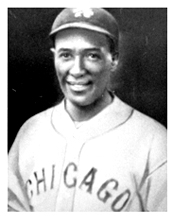

David Julius Malarcher
Nickname: Dave, Gentleman Dave, Cap, Preacher
Career: 1916-1934
Positions: 3b, 2b, ss, rf, c, p, manager
Teams: Indianapolis ABCs (1916-1918), military service (1918-1919), Detroit Stars (1919), Chicago American Giants (1920-1928), Chicago Columbia Giants (1930-1931), Cole's American Giants (1932-1934)
Bats: Both
Throws: Right
Height: 5' 7'' Weight: 148
Born: October. 18, 1894, Whitehall, Louisiana
Died: May 11, 1982, Chicago, Illinois
A smooth-fielding third baseman who did his best hitting in the clutch, Malarcher was a speedy switch-hitter who could bunt and run the bases in the Rube Foster style of baseball. He was also adept at fouling off pitches and working the pitcher for a free pass to first base.
Breaking in as a rookie with the champion Indianapolis ABCs in 1916, he hit .309 and learned baseball under one of the greatest managers in black baseball, C.I. Taylor. After utility service in 1916, he moved into the starting lineup in 1917, batting .240 as the regular right fielder while also logging playing time at third base. During his tenure with the ABCs he also played at second base and was once even pressed into emergency service behind the plate when Cobb, the regular catcher, was injured, and Malarcher caught two exhibition games against the American Association champion Indianapolis team. In 1918 he moved to the third-base position that was to become his home, with partial statistics showing a .227 batting mark for him before entering military service in World War I, when he was drafted into the Army. Along with teammate Jimmie Lyons, he played baseball in the allied Expeditionary Force League in Le Mans, France.
After returning from overseas service, he joined the Chicago American Giants and was afforded the opportunity to learn under the great tactician Rube Foster. This union was to be a lasting one, enduring for a decade and a half. Intelligent and observant, Malarcher learned from Rube and developed into a brilliant baseball strategist when he took over the managerial reins after Foster's mental breakdown.
When Malarcher joined the American Giants in 1920, the inaugural year of the Negro National League, he was called the best third baseman in black baseball and began his career with the American Giants by hitting .344. The first three years, the American Giants won the league championship, with Malarcher's win-fling spirit making him a key cog in Foster's machine, usually batting in one of the top two spots in the lineup. During the middle season of the three consecutive pennants, Malarcher suffered physical setbacks and missed considerable playing time. He was ordered not to play in 1922 because of torn ligaments around his heart, but was undeterred. He injured his leg in May but, determined to play, was back in lineup in July. Despite the handicaps, he managed a batting average of .235 for the 1921 season.
Back to full strength in 1923, he hit .295, and in 1924 Foster moved him to the third slot in the batting order for a season, and he responded with another solid season, hitting .293. In 1925 he succeeded Bingo DeMoss as team captain after DeMoss was shipped to the ABCs by Foster to maintain league balance. Leading by example, Malarcher was a model of consistency, hitting for a .330 average during the season, his last under Foster. The following year, after assuming the position of player-manager, Malarcher was credited with batting averages of .256 and .250 for the 1926-1927 seasons while directing the Giants to consecutive World Series victories over the Eastern colored League champion Bacharach Giants in 1926 and 1927. In each of these two Series he led the team in stolen bases. Malarcher was a rough base runner, but considered "sneaky" by some opponents because he would always apologize after spiking an infielder.
In 1928, his third season as manager, he fractured a bone in his shoulder and was out action for about ten days, but steered his team to the second half title before losing the playoff to the St. Louis Stars. Although highly successful on the diamond, he left the American Giants after the season because of a money dispute with owner William E. Trinkle, and formed the Columbia Giants, an independent team. After three seasons with his new aggregation, he returned to the American Giants, who were now in the new Negro National League, and won his last championship in 1933. After one more final run for the flag, winning the first half championship before bowing to the Philadelphia Stars in the 1934 playoff, "Gentleman Dave" retired from baseball after a full and rewarding career.
Malarcher overcame many obstacles in life to experience his diamond accomplishments. He was born the youngest of ten children to parents struggling to escape the underside of society. His father was a farm laborer on a sugar plantation and his mother was a former slave, but they instilled positive values in their son that he retained throughout his life.
At a very young age he began playing baseball as a catcher with the Baby T's, a team for little boys. He was a clean living, intelligent, and able youngster, and as he grew older he attended Dillard University in New Orleans and Xavier University. During his school days, 1912-1916, he played baseball during the summers with the New Orleans Black Eagles. The team traveled around East Texas and North Louisiana and was owned by a man named Palambo, but the manager was Charlie Stevens, who converted Malarcher from a cross-handed batter into a switch-hitter. After two years of college he signed with the ABCs and began a long and distinguished career in baseball. After his baseball days were over he utilized his education when he established a real-estate business and became an accomplished poet.
Source: James A. Riley, The Biographical Encyclopedia of the Negro Baseball Leagues, New York: Carroll & Graf Publishers, Inc., 1994.

Dave Malarcher